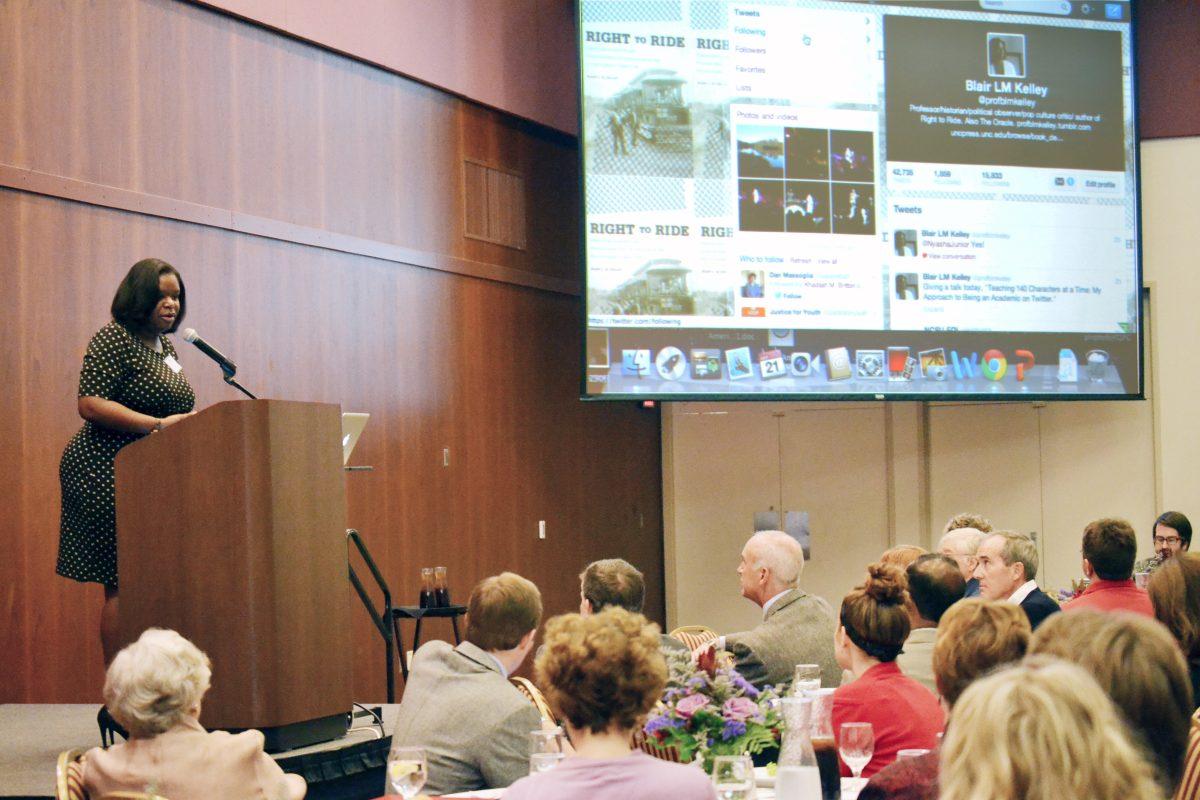The Friends of the Library, a group that supports N.C. State libraries, hosted its annual luncheon Monday, celebrating the opening of Hunt Library and other accomplishments of N.C. State Libraries. About 100 people attended the event at the McKimmon Center, and they enjoyed a lecture about using Twitter as a tool in academia.
“What I picked up was very interesting,” said Beverly Armstrong, who has been involved with the Friends of the Library for about 30 years. “I was reading this morning that email is beginning to be a thing of the past – that everyone is turning to phones and iPads and tablets.”
The Frank B. Armstrong Memorial Book Sale is named after her late husband, who was a professor of biochemistry at N.C. State
Hope Tate, President of the Friends of the Library Board of Directors, welcomed attendees to the luncheon and reviewed the previous year’s events.
“It’s been a wonderful, wonderful year,” Tate said. “With the opening of Hunt Library, it has been an epic year.”
Susan Nutter, vice provost and director of libraries at N.C. State, then presented the 2013 NCSU Libraries Faculty Award. This year, for only the second time in 24 years since the award’s inception, there were two recipients: Joseph Hightower, a professor of applied ecology at N.C. State, and Suzanne Kennedy-Stoskopf, a research professor in the Department of Clinical Sciences.
“We know that [Kennedy-Stoskopf’s] students will be the most library-literate at the University because she has them in the Veterinary library from day one,” Nutter said.
Lauren Kirkpatrick, director of communication for the College of Humanities and Social Sciences, introduced the speaker for the event: Blair Kelley, an associate professor of history. Kirkpatrick said that Kelley, who has close to 16,000 followers, uses Twitter to challenge people to think critically and to understand history.
“Professors are often accused of living in an ivory tower,” Kirkpatrick said. “Well, the only tower you’ll find Dr. Kelley near is a cell tower.”
Kelley, who joined Twitter four years ago to prove to a friend the social network had nothing to offer, said Twitter is shaping news and shaping political campaigns, but it’s often dismissed in academia. She talked about her own experience writing and marketing a book through the social network. She said that it was a place for collaboration and engagement and not a billboard.
“It’s forced me to have to explain my scholarship across lines I didn’t expect,” Kelley said. “It’s been an amazing process. It’s allowed me to learn how to communicate better with my students and given me a chance to mentor people I otherwise wouldn’t be able to.”
Kelley said Twitter users in academia should share the articles they are reading, books they are working on, and photos. Twitter content should be rich, she said, before updating her browser for the audience to demonstrate the fast nature of Twitter feeds.
“The tweets are always moving, which is why I like it,” Kelley said.
Kelley said she’s been able to maintain connections with students after they finish her class through Twitter, and some students have even signed up to take her class after following her online.
“I see more and more professors who are joining Twitter,” Kelley said. “I think they realize it’s a great way to connect with one another, a great way to reach out to students. I see a breakthrough happening.”
Leia Droll, director of Friends of the Library, said her group approached Kelley because of the innovative way she uses social media to reach students.
“The library is a spot on campus where every student has access to new technology, and we always want to be on the cutting-edge of what’s happening,” Droll said. “We were so excited to find Dr. Kelley because she’s using these new technologies in an inspiring way and we think that gels really well with the lib rary’s mission.”
Much of Kelley’s audience consisted of retired faculty or other older members that had never used Twitter or even seen a Twitter homepage. Kelley said it made her nervous speaking to such a crowd.
“Most times I talk about history, so I don’t really talk about anything that’s happened in recent times,” Kelley said. “It was a fun exercise. I talk about Twitter with my students and with my friends all the time, so it was good to formalize my thoughts and figure out what I’ve learned from social media.”
Armstrong said that even though she’d never used Twitter, she enjoyed the talk.
“I try to get in the 21st century, but sometimes I find me back in the 19th,” Armstrong said. “It’s a challenge, and I can see why my age group — that they don’t want to be bothered.”
Armstrong said she does use email and Facebook, mostly to keep up with family events.
“Sometimes when everybody’s sitting in the same room, they’re all sitting with a laptop or a tablet,” Armstrong said. “I don’t know if they’re talking to each other or to someone else.”








